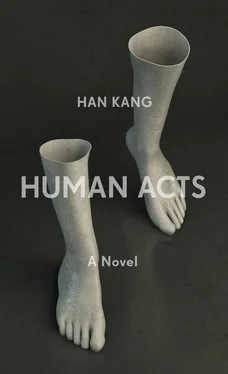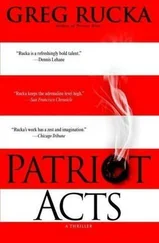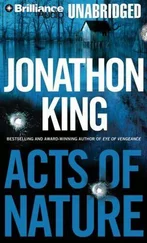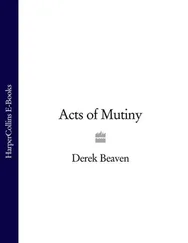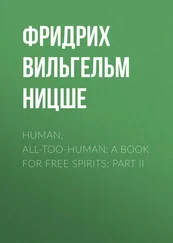Han Kang - Human Acts
Здесь есть возможность читать онлайн «Han Kang - Human Acts» весь текст электронной книги совершенно бесплатно (целиком полную версию без сокращений). В некоторых случаях можно слушать аудио, скачать через торрент в формате fb2 и присутствует краткое содержание. Год выпуска: 2016, Издательство: Portobello Books, Жанр: Современная проза, на английском языке. Описание произведения, (предисловие) а так же отзывы посетителей доступны на портале библиотеки ЛибКат.
- Название:Human Acts
- Автор:
- Издательство:Portobello Books
- Жанр:
- Год:2016
- ISBN:нет данных
- Рейтинг книги:4 / 5. Голосов: 1
-
Избранное:Добавить в избранное
- Отзывы:
-
Ваша оценка:
- 80
- 1
- 2
- 3
- 4
- 5
Human Acts: краткое содержание, описание и аннотация
Предлагаем к чтению аннотацию, описание, краткое содержание или предисловие (зависит от того, что написал сам автор книги «Human Acts»). Если вы не нашли необходимую информацию о книге — напишите в комментариях, мы постараемся отыскать её.
Human Acts
Human Acts — читать онлайн бесплатно полную книгу (весь текст) целиком
Ниже представлен текст книги, разбитый по страницам. Система сохранения места последней прочитанной страницы, позволяет с удобством читать онлайн бесплатно книгу «Human Acts», без необходимости каждый раз заново искать на чём Вы остановились. Поставьте закладку, и сможете в любой момент перейти на страницу, на которой закончили чтение.
Интервал:
Закладка:
I heard a story about one of the Korean army platoons that fought in Vietnam. How they forced the women, children and elderly of one particular village into the main hall, and then burned it to the ground. Some of those who came to slaughter us did so with the memory of those previous times, when committing such actions in wartime had won them a handsome reward. It happened in Gwangju just as it did on Jeju Island, in Kwantung and Nanjing, in Bosnia and all across the American continent when it was still known as the New World, with such a uniform brutality it’s as though it is imprinted in our genetic code.
I never let myself forget that every single person I meet is a member of this human race. And that includes you, professor, listening to this testimony. As it includes myself.
Every day I examine the scar on my hand. This place where the bone was once exposed, where a milky discharge seeped from a festering wound. Every time I come across an ordinary Monami biro, the breath catches in my throat. I wait for time to wash me away like muddy water. I wait for death to come and wash me clean, to release me from the memory of those other, squalid deaths, which haunt my days and nights.
I’m fighting, alone, every day. I fight with the hell that I survived. I fight with the fact of my own humanity. I fight with the idea that death is the only way of escaping this fact.
So tell me, professor, what answers do you have for me? You, a human being just like me.
5 The Factory Girl. 2002
YOU REMEMBER
She told you that the moon was called ‘the eye of the night’.
You were seventeen when you first heard it described that way. It was a Sunday night in spring, when your small labour union group had gathered at Seong-hee’s house. She lived on the top floor, so after the meeting was over you all went up onto the roof, sat in a circle on sheets of newspaper and ate peaches. Seong-hee was twenty, and her romantic nature was frequently fed by poetry. It seems that way, doesn’t it? she said, gazing up at the full moon. An eye cold and pale as ice, looking down on you from the centre of the black sky. That the moon is the eye of the night . You were the youngest of the group, and for some reason those words scared you. It makes it seem frightening when you call it that, Seong-hee . At that, everyone burst out laughing. I’ve never known such a scaredy-cat! one of the women giggled, popping a slice of peach into your mouth. What’s so scary about the moon?
NOW
You get out a cigarette and put it between your lips. You light it, take a deep drag, and feel your tense throat muscles ache.
You’re alone in the second-floor office, a room little bigger than twenty pyeong. None of the windows are open. The heat and humidity of an August evening pummels you as you sit there in front of your computer. You’ve just deleted two spam emails. You still haven’t clicked on the latest arrival in your inbox.
Your hair is cropped short. You are wearing jeans and ultramarine trainers. The sleeves of your pale grey shirt are just long enough to cover your elbows, and at the top of your back the sweat-soaked fabric has darkened to an inky black. In spite of your androgynous outfit, your small frame and slender neck make you seem delicate, almost fragile.
The sweat clinging to the hair behind your ears crawls down over your jaw and drips onto your shirt collar. You run a finger along your upper lip, wiping away the beads of moisture, and click on the email. You read it slowly, twice, then close the browser and switch off the computer. As the monitor’s blue glow fades, the last light in the darkened room, you draw repeatedly on your cigarette, exhaling the smoke in a steady stream.
The cigarette is only half smoked when you place it in the ashtray and stand up. You stick your sweat-gummed fists into the pockets of your jeans. As you walk over to the window, the air inside the sealed office is stiflingly close. The distance from your desk to the window seems a vast expanse. Your movements are sluggish, like wading through water, and even this minimal effort leaves your entire body slick with sweat. Glittering droplets bead your cropped hair.
You stand in front of the window and rest your forehead against the dark glass. The only reflection it holds is that of your own image. The glass is slightly damp, and refreshingly chill. You gaze down at the dark, deserted alleyways, dotted with ashen street lights. You stand up straight, turn to look at the clock on the opposite wall, then, as if doubting its accuracy, check its time against your watch.
UP RISING
I was listening to that sound.
The sound woke me up, but I didn’t have the courage to open my eyes, so I kept them closed and strained to listen in the darkness.
Footsteps, so quiet as to be almost imperceptible. Two feet marking time with the lightest of treads, like a child learning a new and difficult dance.
I felt a knot of pain tightening in my solar plexus.
I couldn’t tell whether it was fear I was experiencing, or happiness.
Eventually, I got up.
I walked towards the sound, and stopped in front of the door.
The wet towel that I’d hung on the handle to try and get a bit of moisture into the air; a pale swatch in the darkness.
That was the source of the sound.
Drops of water steadily tapping down, blotted by the papered floor.
NOW
You place the Dictaphone in front of you on the desk, next to three small, blank cassette tapes, each with a white label attached. Your face shiny with sweat, your breathing, despite your wide-open eyes, as deep and regular as someone asleep, you regard them.
Ten years ago, when Yoon first contacted you, you were still working at the labour rights organisation run by Seong-hee. It was only after getting in touch with her that Yoon had managed to obtain your contact details. You’d listened in silence as he explained the topic of his current dissertation and mentioned the name of the specific civilian militia which he’d chosen as the focus for his ‘psychological autopsy’.
‘I’ll think about it and give you a call.’
When you called him back an hour later and turned down his request for an interview, Yoon simply said that he understood. The following spring, he sent you a copy of his dissertation. You didn’t read it.
A few days ago, contacting you again for the first time in ten years, he said that he really wanted to meet you, just once. His words and tone were cautious. Even a phone interview, he said, would do.
‘The dissertation I sent you back then, did you get round to reading it?’
‘No.’
He seemed somewhat thrown by this, but quickly regained his composure. He told you that he’d since made further enquiries regarding the ten members of the militia whom he’d interviewed for the dissertation, and discovered that there are now only eight left; two had taken their own lives. Of the remaining eight, seven agreed to a follow-up interview. He had taped these interviews, and was planning to include the transcripts in the conclusion of the book he was currently writing, a book in which the dissertation he wrote ten years previously will form a single chapter.
After finishing his speech, he paused.
‘Are you listening?’
‘Yes, I’m listening.’
Whenever you take a phone call, you habitually make a note of any numbers that come up in the course of the conversation. On the memo pad next to you were the digits 10, 8, 2, 7.
‘There were several women who were taken into custody at the time, but I’ve had trouble tracking down an appropriate witness. Even in cases where they were willing to provide a testimony, it was too brief, too simple. Anything painful was just skimmed over … please, do me this favour. I need you, Lim Seon-ju, to be the eighth witness for this book.’
Читать дальшеИнтервал:
Закладка:
Похожие книги на «Human Acts»
Представляем Вашему вниманию похожие книги на «Human Acts» списком для выбора. Мы отобрали схожую по названию и смыслу литературу в надежде предоставить читателям больше вариантов отыскать новые, интересные, ещё непрочитанные произведения.
Обсуждение, отзывы о книге «Human Acts» и просто собственные мнения читателей. Оставьте ваши комментарии, напишите, что Вы думаете о произведении, его смысле или главных героях. Укажите что конкретно понравилось, а что нет, и почему Вы так считаете.
